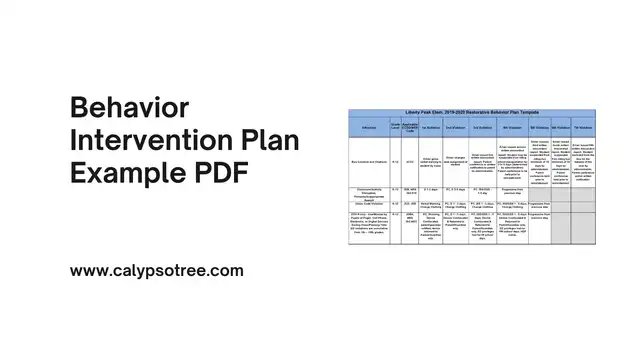Free Child Travel Consent Form Example – A Child Travel Consent Form, also known as a travel authorization letter, is an official document that serves as a formal declaration of consent from a child’s legal guardian or parent, authorizing a minor to journey domestically or internationally without their immediate company.
What is a Child Travel Consent Form?
Typically, this essential legal instrument assists in curbing child abduction and trafficking and aiding the fulfillment of immigration requirements. It is a critical protective mechanism, ensuring a child’s travel is legitimate and secure.
Writing a Child Travel Consent Form
Drafting a Child Travel Consent Form is not merely an exercise in administration; it is a mission of ensuring the safety and security of minors on their journey. Below are the key steps to craft a comprehensive and effective form.
- Step 1: Gather the Necessary Information
The first step is to gather all necessary information about the trip, including the child’s details, the accompanying adult’s details, travel dates, and destination. Also includes any specific information, such as medical details or additional contact persons.
- Step 2: Outline the Document
Begin the document by stating your full name and address, followed by an affirmation that you are the legal parent or guardian of the child. Proceed by providing the child’s full name, date of birth, gender, nationality, and passport number.
- Step 3: Specify Travel Details
The next section should encompass the travel details. Includes the location the child is departing from, the destination, and the travel dates. Also, include information about the adult accompanying the child on the journey.
- Step 4: State the Purpose of the Trip
Outline the purpose of the trip. Provides a clear context for the journey and can include details like the reason for the travel, planned activities, or the duration of the stay.
- Step 5: Include Medical Details
A critical aspect of the form is the child’s medical information. Outline any existing medical conditions, regular medications, allergies, and consent for the accompanying adult to authorize necessary medical treatments in emergencies.
- Step 6: Provide Emergency Contact Details
Provide the contact details of an individual who can be contacted in an emergency. It could be the non-traveling parent, a relative, or a close family friend. Include their name, relationship to the child, phone number, and email.
- Step 7: State Your Consent
Draft a clear consent statement indicating you authorize the child to travel with the specified adult for the specific dates and destination. The language should be unambiguous and explicit.
- Step 8: Signature and Date
Conclude the document by signing and dating it. If there is more than one legal parent or guardian, all should sign the document.
- Step 9: Notarization
To enhance the legal enforcement of the document, consider having it notarized. Involves signing the document before a notary public, who will sign and stamp it, certifying its authenticity.
This detailed guide provides a roadmap for constructing a robust Child Travel Consent Form. However, it is always recommended to consult with a legal professional to ensure all specifics of your situation are covered appropriately.
What Information Should Be Included in a Child Travel Consent Form?
A Child Travel Consent Form must be thorough and explicit, leaving no room for ambiguity. It is critical to incorporate all relevant information meticulously. The following segments illustrate the diverse elements that should be contained within a well-drafted Child Travel Consent Form:
Personal Information about the Child
This refers to the child’s full name, birth date, and passport number. This information is pivotal for identification and verification purposes. It is also advisable to include the child’s birthplace, gender, and nationality for more exhaustive detailing.
Travel Itinerary
The form should clearly state the dates of departure and return, along with the complete addresses of the origin and destination. Also, elucidate whether the trip is one-way or round-trip. Information about any layovers or stopovers, including dates, times, and locations, should also be stated to provide a clear picture of the journey.
Reason for Travel
State the explicit purpose of the child’s journey. Is it a vacation, a school trip, or a visit to relatives? Clear communication of the reason for travel helps officials understand the context of the trip.
Accompanying Adults
Include full names, addresses, passport details, and contact information of the person or persons accompanying the child. If the minor is traveling alone, include information about who will receive the child upon arrival at the destination. A detailed relationship of the accompanying adult to the child should also be included.
The parent or Legal Guardian Details
The form should comprise the full names, addresses, contact information, and photocopies of identification documents of the child’s parents or legal guardians. If applicable, legal proof of custody arrangements should also be attached.
Medical Information
Medical considerations are vital for the child’s safety. State any existing medical conditions, allergies, or medications the child may require. The child’s doctor’s name, contact information, and health insurance details should also be included.
Emergency Contacts
In addition to the parents’ or legal guardians’ contacts, providing additional emergency contact information is prudent. This might be a close relative, family friend, or neighbor who can be reached in case of an unforeseen circumstance.
Parent or Guardian Consent Statement
This statement, signed by the parent(s) or guardian(s), officially authorizes the minor’s travel. It also empowers the accompanying adult to make decisions regarding medical treatments or emergencies during the trip.
Each of these elements collectively creates a robust Child Travel Consent Form, serving as a beacon of clarity amid the complexities of child travel. Remember, the goal is to ensure the child’s safety and to provide a seamless travel experience free of unnecessary complications.
When is a Child Travel Consent Form Needed?
This form is not simply a piece of bureaucratic procedure but a vital tool for ensuring the safety and protection of a minor during their journey. Here are the specific instances when this document becomes essential:
Travel without Both Parents
One of the primary scenarios where it is required is when a minor travels without the accompaniment of parents or legal guardians. Whether traveling independently, with a family, or with a friend, the form is important to confirm the parent’s or guardian’s consent for the journey.
Single Parent Travel
A Child Travel Consent Form is suggested when one parent travels with the child, particularly in cases of divorce or separation. This scenario often requires proof that the guardian has agreed to the travel arrangement.
Organized Group Trips
It is crucial for group trips, such as school excursions or team tournaments, where teachers, coaches, or non-family members lead the children’s group. Each child’s form asserts the organization’s authority to guide them during the journey and protects the group leader from potential legal complications.
Temporary Stay with a Host Family
The form is essential if the child stays with a host family in another country or domestically. This record indicates that the parent or guardian has permitted the minor to stay with the specified host.
High-security Measures
During heightened security periods, such as national emergencies, authorities may enforce the Form requirement more stringently. This document can expedite the clearance process and reduce the risk of misunderstandings or false alarms.
Custody Disputes
In instances where the custody of the child is shared or disputed, the form becomes even more crucial. It acts as a written record that both parents or guardians have consented to, reducing the risk of legal conflicts.
Immigration and Visa Procedures
Certain immigration and visa procedures require a Form, especially for international travel. This document allows requirements and ensures smoother processing.
In these specific circumstances, the Child Travel Consent Form acts as a shield, protecting the interests of the minor, the concurrent adult, and the parent or lawful protection. Being equipped with this form reduces the risk of unnecessary complications, establishing a seamless travel experience for all involved parties.
The Benefits
The Sample Child Travel Consent Form presents itself as an indispensable tool in the broad arena of child travel. It extends beyond the scope of mere paperwork and manifests numerous benefits instrumental in ensuring the child’s safety, security, and smooth passage during their journey. Let us dissect these benefits in greater detail:
Enhanced Security
A Child Travel Consent Form is a bulwark against threats like child abduction and trafficking. It ascertains that the minor is not traveling under duress or being unlawfully transported across borders. Therefore, this document is a proactive measure that enhances the security quotient attached to child travel.
Facilitation of Travel
One of the critical advantages of this form is that it aids in simplifying domestic and international travel. In the face of immigration requirements and airline policies, the document acts as an unambiguous endorsement from the parent or legal guardian for the child’s journey, eliminating potential bureaucratic snags.
Fostering Trust
The presence of a Child Travel Consent Form nurtures an atmosphere of trust. Be it airline authorities, immigration officers, or the host family in another country. The document assures that the child’s travel arrangements are above board. It communicates transparency, reducing the likelihood of unwarranted suspicions.
Medical Authorization
In the unfortunate event of a medical emergency during the journey, the form, furnished with details about medical conditions and medications, enables the accompanying adult to take immediate action. It expedites medical assistance by authorizing the adult to consent to any required treatments.
Emotional Assurance
For parents or guardians, the thought of their child traveling without them can induce anxiety. The Child Travel Consent Form is a mechanism that offers emotional assurance. It ensures that the adults responsible for the child during travel can take appropriate action in any situation, thus providing peace to the parents.
Minimized Legal Complications
A well-drafted Child Travel Consent Form can help to preempt legal complications. In situations where custody arrangements are in place or the case of international travel regulations, having a signed and notarized document keeps potential legal hassles at bay.
Each benefit represents a different facet of the Child Travel Consent Form’s comprehensive protection. This document’s significance lies in its multipurpose role of security enhancement, travel facilitation, trust fostering, medical authorization, emotional assurance, and legal complication minimization. It stands as a testament to the proactive measures that can be taken to ensure the safest possible travel experience for children.
The Risks
Understanding these risks provides ample motivation to ensure this key document’s proper handling. Below is an exploration of the potential pitfalls of neglecting a Child Travel Consent Form.
Facilitation of Unlawful Activity
Without a Child Travel Consent Form, one of the most severe risks is the potential facilitation of unlawful activities such as child abduction and trafficking. The lack of clear, written consent from the legal guardian or parent opens up a potential avenue for malicious entities to exploit.
Travel Interruptions and Delays
With a Child Travel Consent Form, children and their accompanying adults may avoid unexpected interruptions or delays during their journey. They may be subject to additional scrutiny by immigration officers, airline officials, or law enforcement agencies, potentially leading to missed flights or unforeseen detainment.
Accusations of Impropriety
The individual traveling with the child could become the subject of severe accusations if they fail to provide a Child Travel Consent Form. It could range from suspicions of child abduction to accusations of child endangerment or impropriety, which could have serious legal implications.
Medical Risks
In the unfortunate event of a medical emergency, the absence of a Child Travel Consent Form could prove perilous. If the form, complete with a medical authorization clause, is unavailable, the accompanying adult may avoid obstacles in authorizing necessary medical treatment for the child.
Emotional Trauma to the Child
Without a Child Travel Consent Form, a child might be subjected to intensive questioning by authorities, an experience that could be quite traumatic. Furthermore, the emotional impact could be substantial if their travel is significantly delayed or they are separated from their accompanying adult due to legal issues.
Legal Complications
Failing to provide a Child Travel Consent Form may lead to legal complications. In the context of international travel, where child protection laws and immigration policies are stringent, the lack of this document might even result in repatriation or deportation.
From these risks, it becomes clear that the Child Travel Consent Form plays a pivotal role in safeguarding both the child and the accompanying adult. Its absence can usher in a spectrum of negative scenarios, emphasizing the crucial need for this document in any context of child travel.
Child Travel Consent Form Example
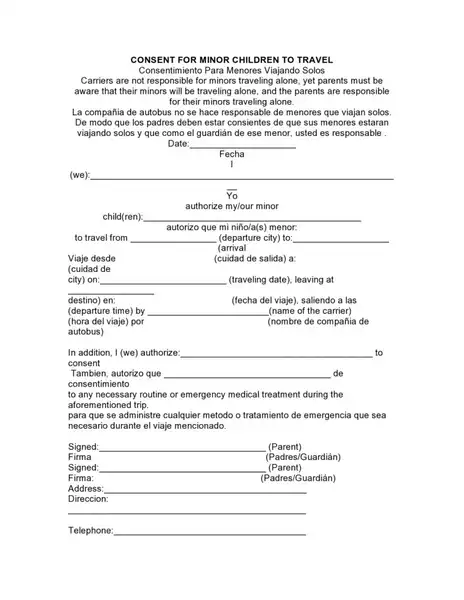
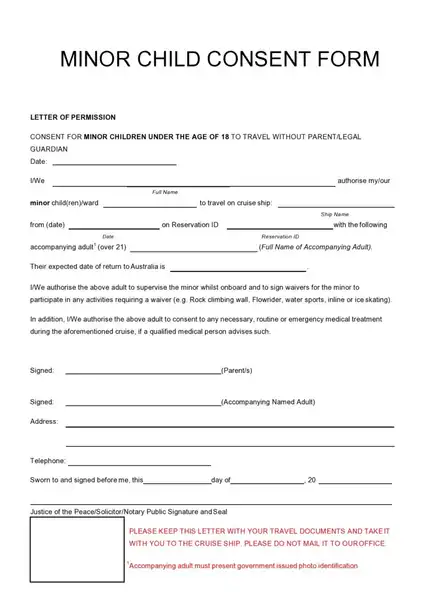
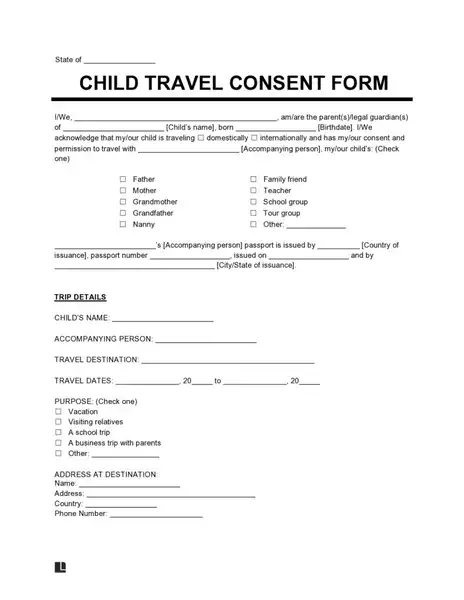
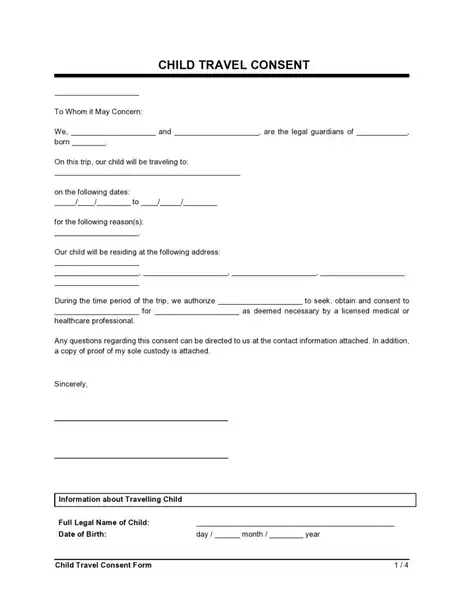
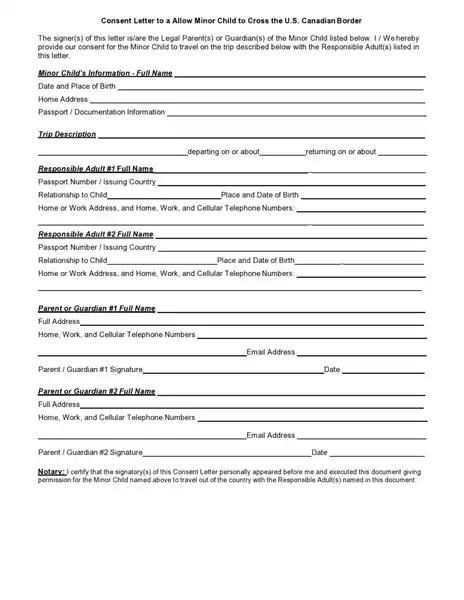
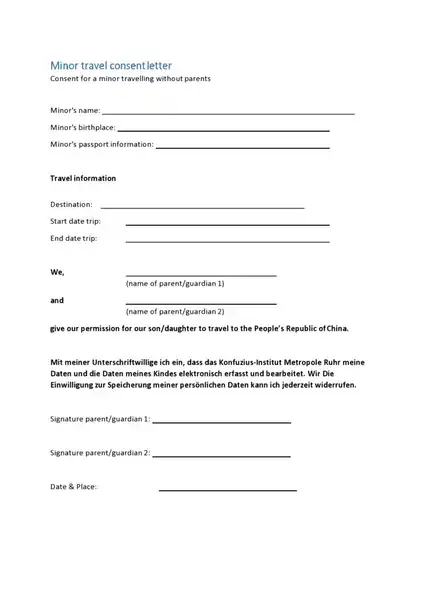
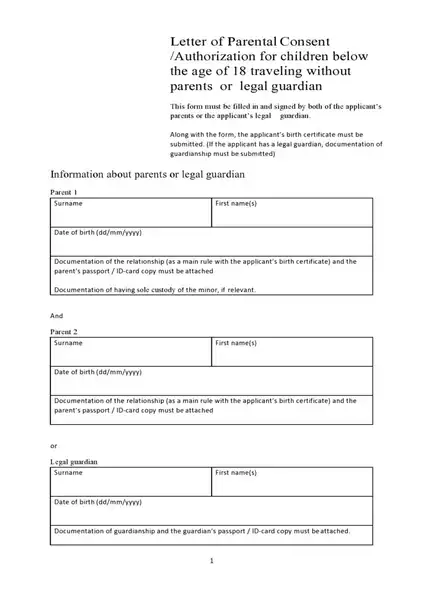
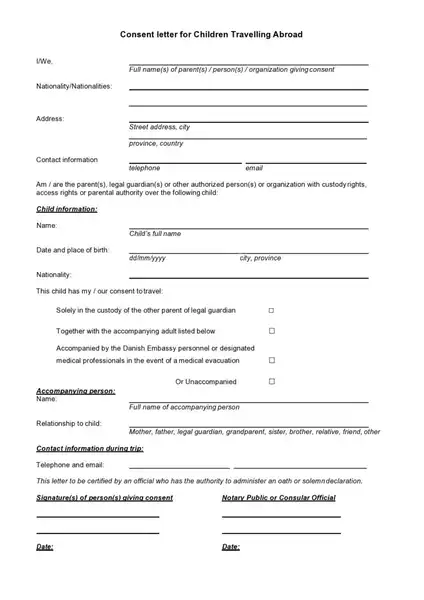
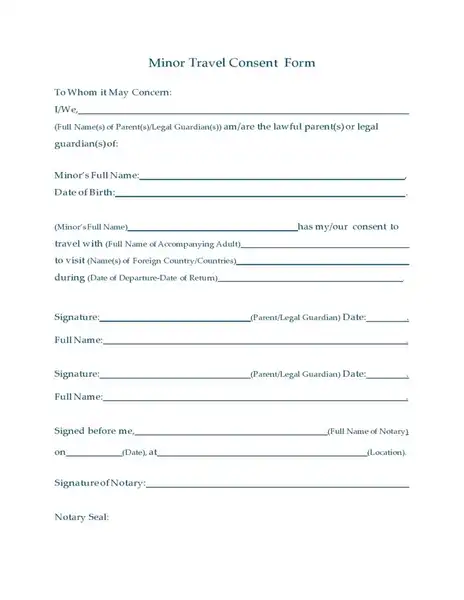
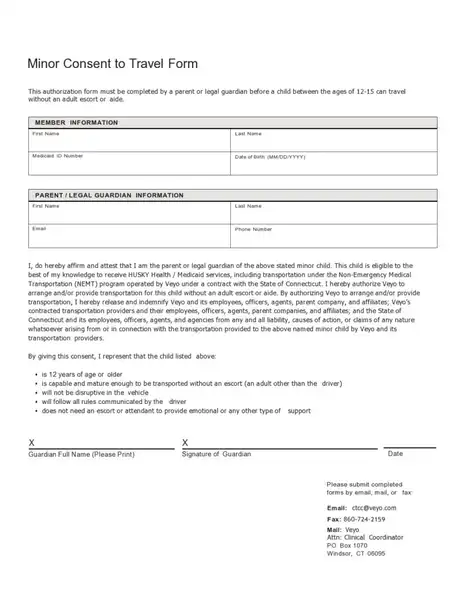
Practical Tips for Ensuring a Smooth Travel Experience
Here are some indispensable tips for fostering a seamless travel experience:
Prepare Well in Advance
Start by organizing all necessary documents well ahead of time. It includes passports, visas, tickets, and, most importantly, the Child Travel Consent Form. Remember that rushing at the last minute can lead to mistakes or forgotten documents, potentially complicating the journey.
Make Multiple Copies of the Child Travel Consent Form
Having multiple copies of the form can be useful in various situations. For instance, if one copy is misplaced, or if you need to submit one at immigration and keep one for your records, having multiple copies is advantageous.
Translate the Form for International Travel
If you are traveling to a country where English is not the primary language, consider translating the Child Travel Consent Form into the local language. It may facilitate quicker processing at immigration and can also be beneficial in encounters with local law enforcement.
Keep Medical Details Handy
Medical emergencies can occur without warning. Have the child’s medical information easily accessible, along with any medication they may need during travel. The Child Travel Consent Form should contain this information, but carrying an additional document detailing medical specifics can prove beneficial.
Prepare the Child
Take the time to explain the travel process to the child. Make them aware of the purpose of the journey, the person they are traveling with, and what they can expect. It can help reduce anxiety and equip them with the confidence to handle the journey.
Be Mindful of the Child’s Needs
During travel, ensure you have everything to make the child comfortable. It includes snacks, entertainment, and comfort, especially for long journeys. Remember, a happy and content child can make the entire experience smoother.
Establish a Line of Communication
Ensure the child can contact their parent or guardian at any time. If the child is old enough, equip them with a cell phone and ensure they know how to use it. If the child is younger, the accompanying adult should have the necessary contact details.
Be Ready for Emergencies
Have an emergency plan in place. It might include what to do if the child gets lost, whom to contact, and how to seek help. Equipping the child with an ID bracelet or card can also be beneficial.
These practical tips, combined with the thorough use of a Child Travel Consent Form, pave the way for a smooth and memorable travel experience. Each measure adds a layer of protection, providing a safety net allowing adventure, discovery, and joy in each journey step.
Who Should Sign a Child Travel Consent Form?
The signing of a Child Travel Consent Form should be executed by either both parents or the legal guardian(s) of the child. When one parent has sole custody, they can sign unilaterally. However, in joint custody cases or where guardianship is shared, the consensus of all involved parties is required.
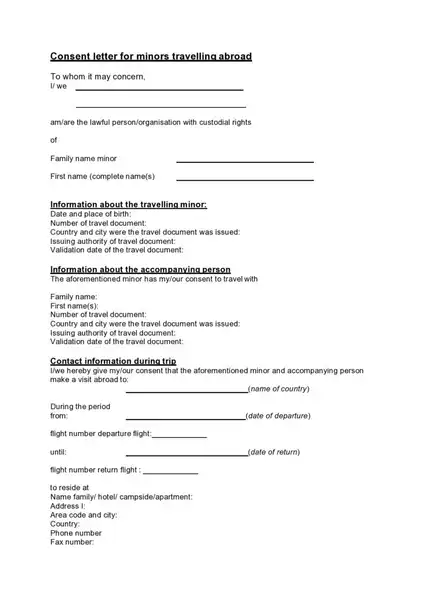
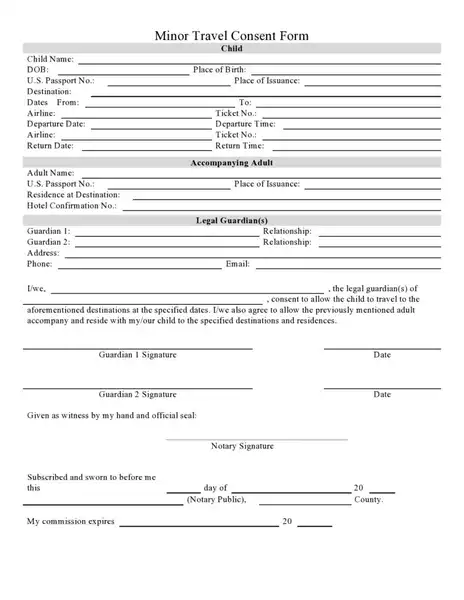
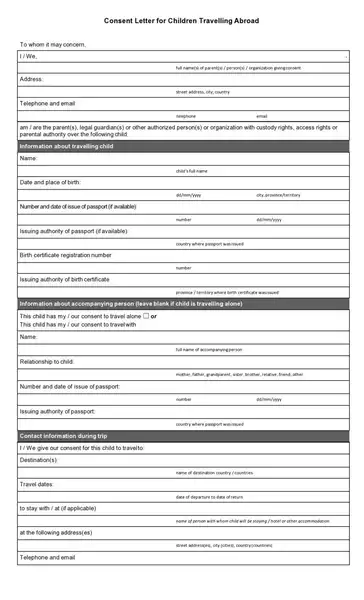
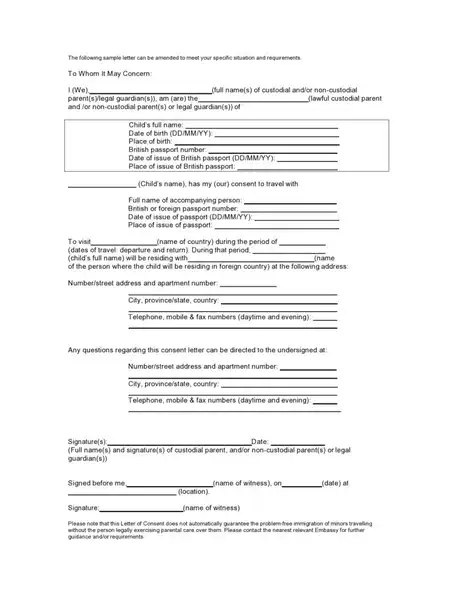
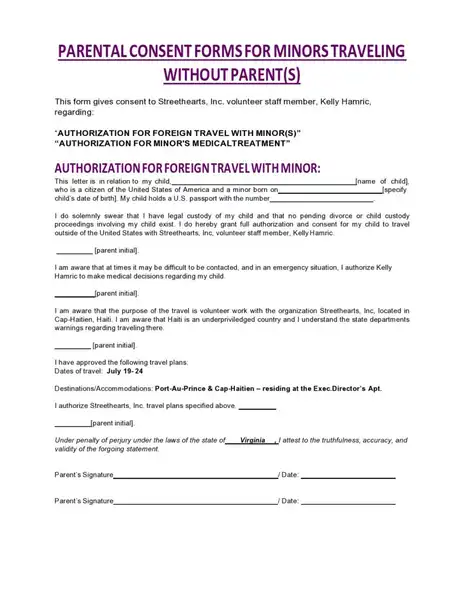
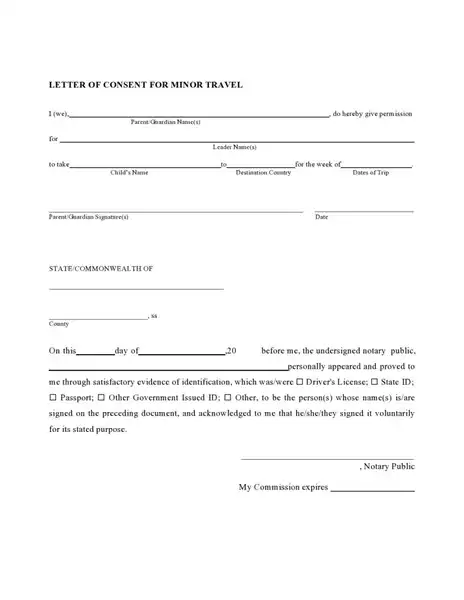
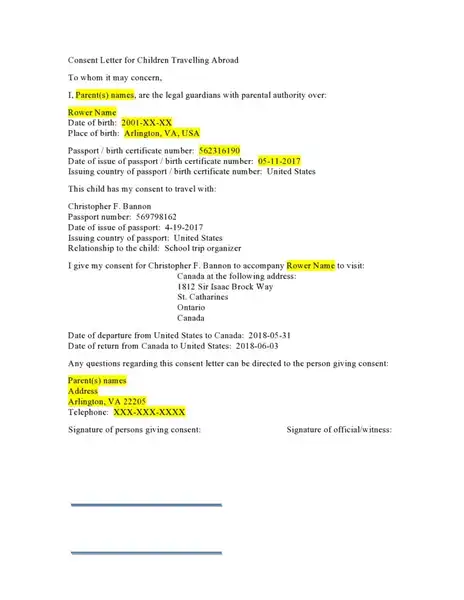
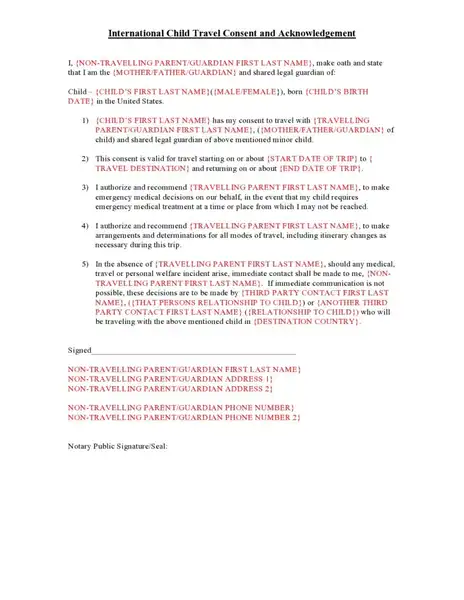
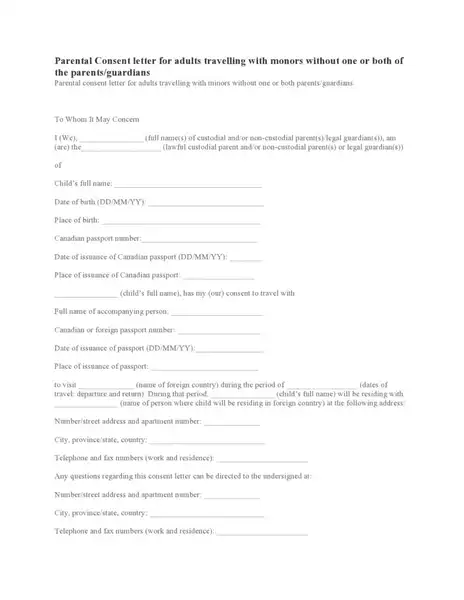
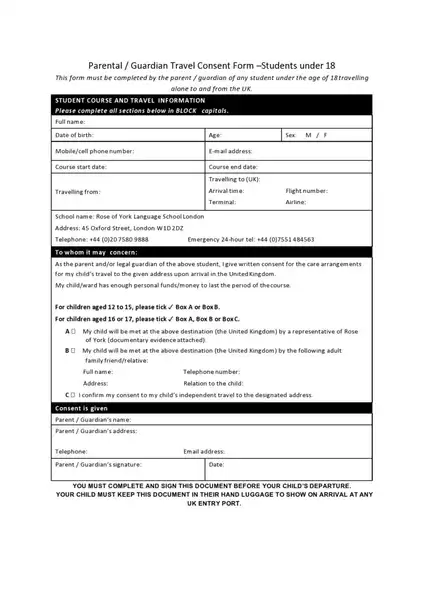
Does a Child Travel Consent Form Need to Be Notarized?
Though not universally mandated, having a Child Travel Consent Form notarized confers added legitimacy. Notarization is an incontrovertible endorsement of the identities of the signing parties and the authenticity of their signatures. While it might seem like an extra bureaucratic hoop, it helps significantly reduce potential complications or disputes during travel.
What Are the Consequences of Not Having a Child Travel Consent Form?
Without a Child Travel Consent Form, a child’s travel might be marred by undesirable complications, ranging from substantial delays to outright denial of entry at immigration checkpoints. In more extreme scenarios, the accompanying adult could be accused of child abduction, leading to legal consequences. The emotional toll on the child could also be significant, turning an otherwise exciting travel experience into a stressful ordeal.
Where Can I Get a Child Travel Consent Form?
Acquiring a Child Travel Consent Form Template is straightforward. Templates can be sourced from legal advice websites, travel-related platforms, or certain airlines’ official websites. Nevertheless, consulting with a lawyer or legal expert has been recommended to ensure airtight legal coverage. A professional will tailor the form to your unique circumstances, guaranteeing the protection of all parties involved.
Child Travel Consent Form Template
I/We,
[Full Name of Parent(s) or Legal Guardian(s)]
of
[Full Address]
Do solemnly declare that I am/we are the lawful parent(s)/guardian(s) of:
[Full Name of Child]
[Birth Date]
[Gender]
[Nationality]
[Passport Number]
TRAVEL DETAILS
The child will be traveling to
[Destination]
from
[Departure Location]
on the following dates:
[Departure Date] to [Return Date]
The child will be accompanied by:
[Full Name of Accompanying Adult]
[Full Address]
[Relationship to Child]
[Passport Number]
TRAVEL PURPOSE
The purpose of the trip is:
[Provide details of travel purpose]
MEDICAL DETAILS
The child has the following medical conditions:
[Provide details of medical conditions]
The child takes the following medication regularly:
[Provide details of regular medication]
The child is allergic to:
[Provide details of allergies]
In case of a medical emergency, the accompanying adult has my/our permission to authorize necessary medical treatment for the child.
EMERGENCY CONTACT
In case of emergency, please contact:
[Name]
[Relationship to Child]
[Phone Number]
[Email]
CONSENT
I/We give consent for the child named above to travel with the individual named above for the dates and destination specified.
SIGNATURES
Signature of Parent/Guardian Date
Signature of Parent/Guardian Date
This document should be notarized for additional legal enforcement. Remember, a thorough and meticulous Child Travel Consent Form lays the foundation for a safe, secure, and enjoyable travel experience for the child.
Conclusion
In the contemporary globalized world, the Child Travel Consent Form is a formidable safeguard, offering peace of mind to parents and legal authorities alike. Understanding and implementing this vital document can ensure a smooth, safe, and pleasant journey for the youngest explorers navigating the labyrinth of child travel.

The content creator team at calipsotree.com is dedicated to making topics accessible to everyone, with over 9 years of experience in writing and breaking down complex concepts into easy-to-understand articles that answer readers’ financial questions.







